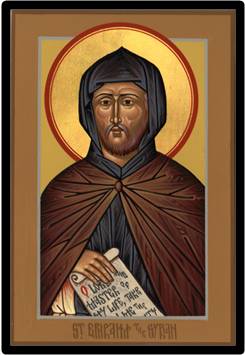JUNE 9 - ST. EPHREM

Ephrem was born at Nisibis in Mesopotamia (which is now Syria) and was born in a pagan family. Pagans are people who believe in false gods. When he was a teenager, he heard St. James preach about how Jesus had died for us so we could be saved. At the age of eighteen Ephrem asked to be baptized and joined the Catholic Church.
Ephrem then went into the hills found himself a cave near the city of Edessa in Syria and became a hermit. His clothes were just patched rags and he ate any fruit, vegetable or edible leaves that he could find.
Ephrem became angry easily but prayed sincerely about it. He slowly learnt to control his temper. People who met him thought he was just naturally very calm. He often went to preach in Edessa and Nisibis. When he spoke about God’s judgment, the people wept.
He would tell them that he was a great sinner. He really meant it, too, because although his sins were small, they seemed very big to him. When St. Basil met him, he asked, “Are you Ephrem, the famous servant of Jesus?” Ephrem answered quickly, “I am Ephrem who walks unworthily on the way to salvation.” Then he asked for and received advice from St. Basil on how to grow in the spiritual life.
Ephrem was made deacon of Edessa and spent his time writing spiritual books. He wrote in several languages - Syriac, Greek, Latin and Armenian. These works are so beautiful and spiritual that they have been translated into many languages and are read even today.
Ephrem also wrote hymns for public worship and introduced singing during the Mass. These hymns became very popular. As the people sang them, they learned much about the faith. That is why he is called “the harp of the Holy Spirit.” Because he was such a great teacher through his writings, in 1920 he was proclaimed a Doctor of the Church.
Ephrem died in June, 373, at Edessa (which is now in Iraq).
